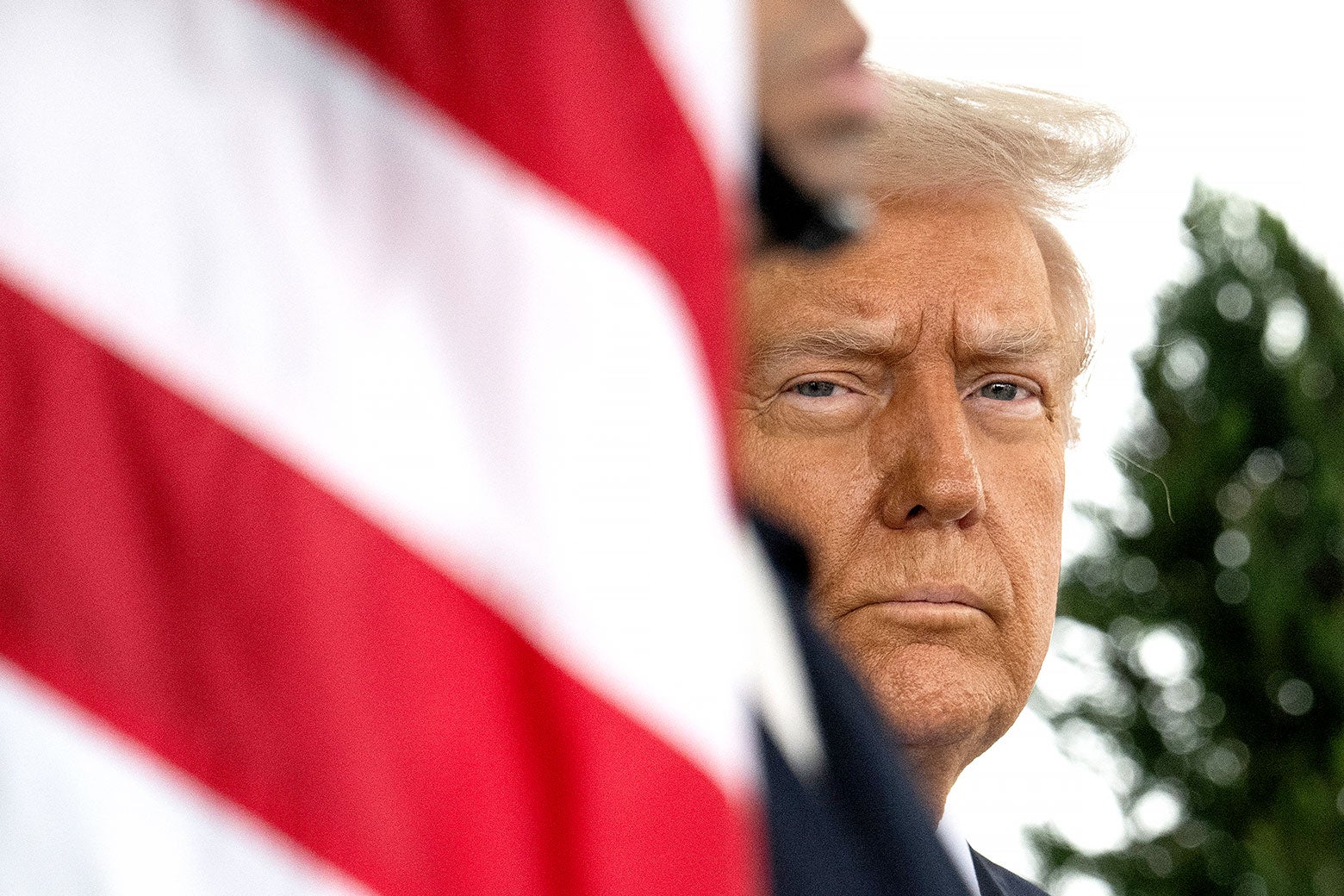Sign up for the Slatest to get the most insightful analysis, criticism, and advice out there, delivered to your inbox daily.
The legal counteroffensive against the Trump–Musk deconstruction of the federal government has begun. State attorneys general, unions, and other groups have already obtained multiple restraining orders and injunctions commanding that illegally frozen funds flow and illegally suspended employees be reinstated. However, the Trump administration has, predictably, proved reluctant to comply. Indeed, in some instances, it is simply defying court orders. For example, here in Colorado, more than $570 million in congressionally authorized funds is being unlawfully withheld from public and private groups, despite court orders commanding that the Trump freeze on the money be lifted.
As a result, the media is full of speculation about what happens if the president simply ignores court orders. This question really has two parts. First, what can courts do to compel compliance with their orders? Second, what happens to the country if Trump remains recalcitrant and the courts’ enforcement powers prove ineffectual? It’s important to answer the first question before getting to the second.
The fundamental weakness of courts is that their orders have force only if people, including government officials, obey them. In a society with a strong rule-of-law tradition, obedience rarely if ever requires compulsion, and almost never when the courts order an executive branch official to do something. Indeed, the characteristic feature of a country ruled by law is the shared understanding that court orders will be obeyed without the necessity of employing force or other modes of coercion.
Still, even in ordinary times, there will be cases when those subject to court orders refuse obedience. The courts’ primary remedy in such instances is to find the defiant litigant in contempt of court.
Contempt proceedings are of two kinds: civil and criminal. The purpose of civil contempt is to compel compliance with a court order. A court may impose fines (which can escalate every day that disobedience of the court’s order continues) or command disobedient subjects to be jailed until they comply. Because the point of civil contempt is to coerce obedience, the fines may be remitted, and contemners (those found in contempt) must be released once they have complied with the order.
Criminal contempt, by contrast, is designedly punitive. The point is to punish someone for having defied the court in the past regardless of whether that person later complied with court orders. Thus, a defendant found in criminal contempt can be fined, imprisoned, and subjected to all the collateral consequences of any criminal conviction. And the penalties, once imposed, are not waived after compliance is achieved.
Before finding someone in civil contempt, a court must provide notice and an opportunity to be heard, but neither a jury trial nor proof beyond a reasonable doubt is required. However, criminal contempt is a crime in the ordinary sense, and thus contempt defendants must be afforded all the rights of any criminal defendant, including a jury trial in serious cases involving the possibility of imprisonment for more than six months.
Ordinarily, criminal contempt cases are prosecuted by the Department of Justice upon referral by the courts. One might think that the avenue of criminal contempt could be blocked if the DOJ refused the referral. However, Federal Rule of Criminal Procedure 42(a)(2) permits a court to appoint a private attorney to prosecute a criminal contempt if the government declines to do so.
To those outraged by the Trump administration’s ongoing violations of constitutional and statutory law and its incipient defiance of court orders, all this no doubt sounds quite satisfactory. And the vision of Office of Management and Budget Director Russell Vought or, indeed, Elon Musk being frog-marched off to the hoosegow will warm the cockles of many a heart.
However, although courts certainly could charge individual administration officials with either civil or criminal contempt for defying judicial orders and, after an appropriate proceeding, order them fined or jailed, the great question is whether that order would be enforced.
Several commentators have mentioned the possibility that Trump could nullify any criminal contempt with a pardon. In theory, that is true. The pardon clause of the Constitution grants presidents the power to issue reprieves and pardons for “offences against the United States.” That last phrase refers to crimes and not civil violations of the law. Thus, a president plainly could not use the pardon to void a civil contempt. However, the Supreme Court has held that presidents can pardon criminal contempt, and many have done so.
In Trump’s first term, several prominent scholars suggested that the pardon power did not extend to criminal contempt convictions such as that of former Maricopa County Sheriff Joe Arpaio, whom Trump controversially pardoned in 2017. At least under the circumstances of that case, their arguments seemed to me unconvincing, as I explained at the time. That said, should Trump begin employing pardons not as an individual act of clemency for a particular defendant but as part of a systematic effort to nullify the power of the judiciary to enforce its orders against the executive branch, the calculus would be quite different, and even this Supreme Court might be induced to reexamine the point.
Even if one assumes that a presidential pardon would be effective against any criminal contempt verdict against an executive branch official, regardless of the circumstances or the president’s anti-constitutional motives, a president can pardon only past criminal conduct. Accordingly, if Vought and Musk defied a court order on Monday, were found in criminal contempt on Tuesday, were pardoned on Wednesday, and continued to defy the court order on Thursday, they would still be in contempt and subject to yet another prosecution. In theory, therefore, one could see a merry-go-round of referrals and charges followed by pardons followed by referrals and charges, and so on into perpetuity. But this seems in the highest degree unlikely. Instead, the increased procedural complexity of criminal contempt proceedings combined with the specter of presidential pardons renders criminal contempt an improbable recourse for the judiciary.
That leaves civil contempt, which, as noted, authorizes the imposition of fines, imprisonment, or both to compel compliance with judicial orders.
The looming obstacle to deployment of civil contempt against Trump’s merry band of constitutional arsonists is the reality that judges do not arrest or imprison people themselves. Nor does the judicial branch have its own armed employees to arrest those who defy its orders or its own jails in which to hold prisoners. Those jobs are performed by the U.S. Marshals Service and the Federal Bureau of Prisons … which are both components of the DOJ and are thus subordinate to the attorney general, who is subordinate to Trump. Even an order imposing a fine can be enforced only against a noncompliant defendant by action of the Justice Department.
It is true, of course, that the primary traditional function of the U.S. Marshals Service is to act as the enforcement arm of the courts. Indeed, the service is geographically organized to serve that purpose. It has a local office in every federal judicial district that is customarily housed in the federal courthouse. On a day-to-day basis, the marshals operate under the direction of federal judges. Likewise, the Bureau of Prisons has always, and without question, received and housed prisoners ordered incarcerated by the judiciary.
However, an attorney general could conceivably order the marshals not to enforce a contempt order against a Trump administration official and could conceivably order the BOP not to incarcerate such an official despite a court order to do so. It is possible that the marshals or the BOP might view such an order as illegal and refuse to obey. But the events of the past several weeks suggest that any officers of the Marshals Service or BOP who honored their constitutional duty in this way would promptly be fired and replaced by more-complaisant successors.
Should the attorney general order the marshals and BOP not to enforce a judicial contempt order against an administration official, that would be an open repudiation of the rule of law and a plain declaration of presidential dictatorship.
My own, entirely uncertain, assessment of the current state of play is that the Trumpists would rather not baldly declare a dictatorship but instead overwhelm the courts and the political system with daily assaults on law and custom coupled with persistent, contumacious, but never candidly avowed noncompliance with court orders. The objective of this approach, consistent with Trump’s lifelong approach to litigation, is to delay a conclusive showdown with the judiciary so long that, whatever the legal outcome, the destruction of the federal government and subjection of the executive branch to Trump’s whim will have proceeded too far to be undone.
The judges are surely aware of the fragility of their own authority in the face of outright defiance by a rogue executive, particularly in a moment when Congress has shown no disposition to defend constitutional separation of powers. For that reason, judges may be reluctant to deploy their contempt power assertively. But this is not the time for judicial timidity. With each passing day, America’s constitutional regime and the capacity of its government erodes further. And with each passing day, the practical ability of the courts to stop, or even materially hinder, the catastrophe diminishes. If there is to be a test of wills between law and Trumpism, it must come now, or it will be too late.
That said, the rest of us need to understand that if Trump successfully defies the courts, the only remaining obstacle to dictatorship will be public revulsion, national popular protest, and the hope that such a reaction would cause Trump to retreat and, at long last, recall some fraction of the Republican Party to its constitutional duty.

















